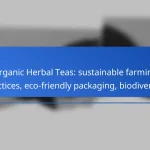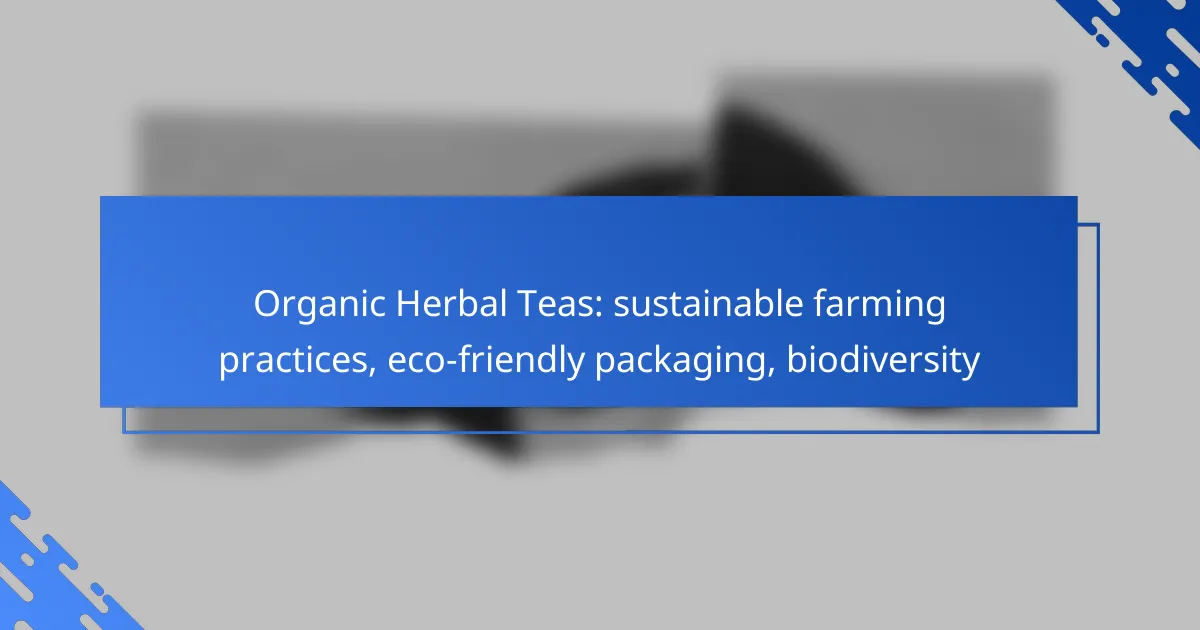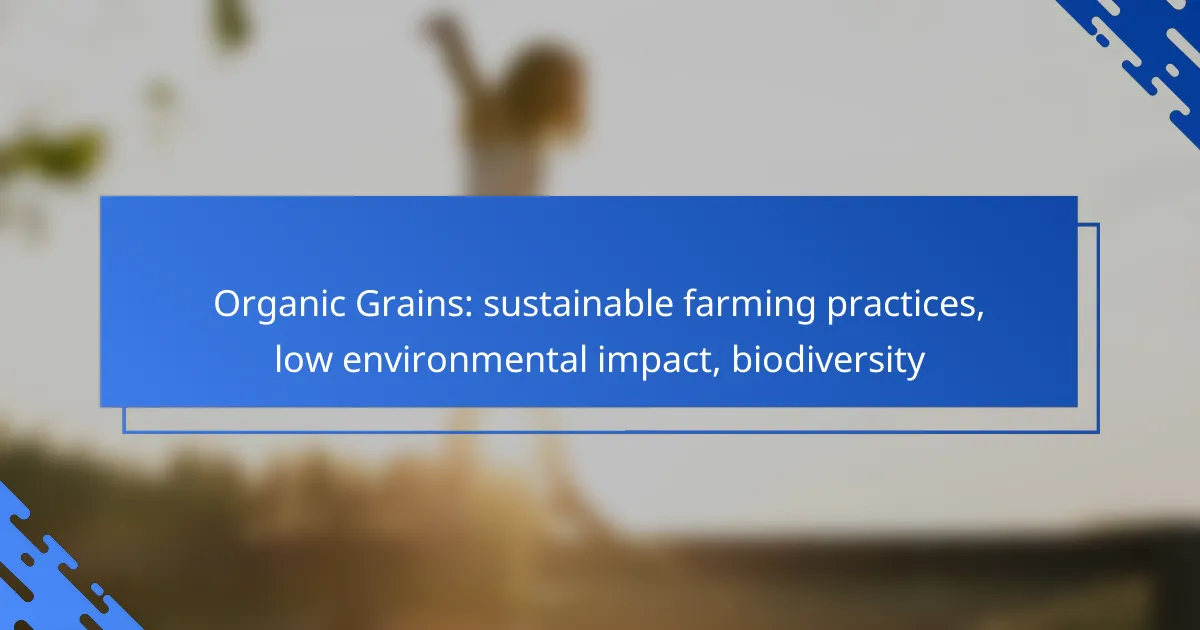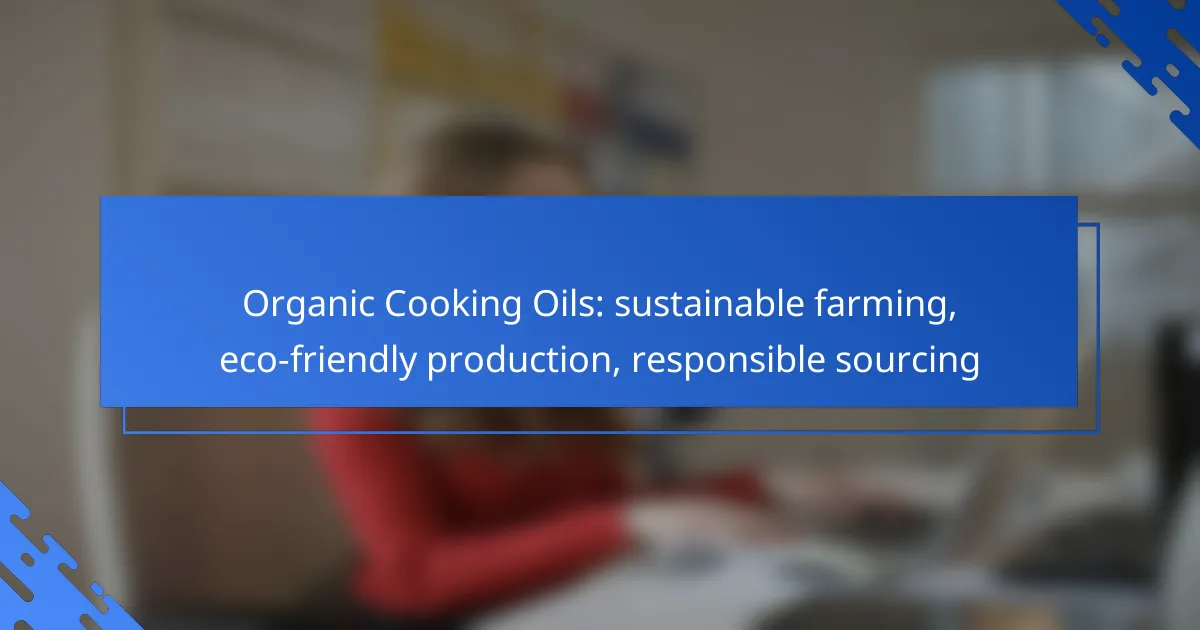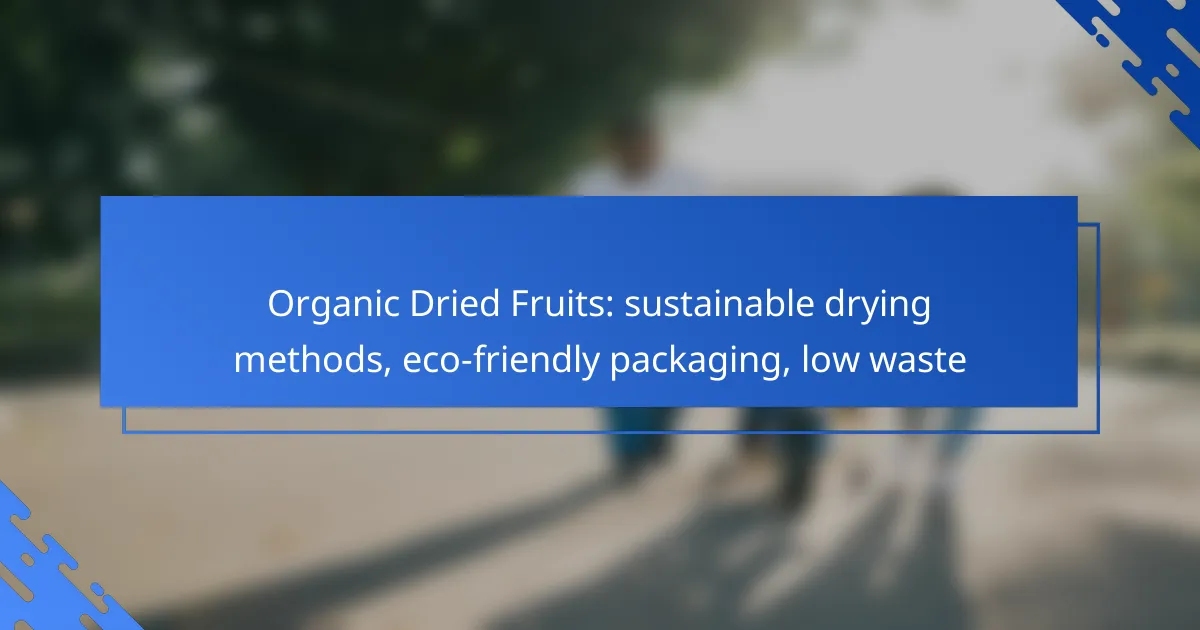Organic herbal teas are not only a delightful beverage choice but also a testament to sustainable farming practices that prioritize ecosystem health and local economies. By utilizing eco-friendly packaging and promoting biodiversity, these teas ensure a minimal environmental footprint while enhancing flavor and quality. Embracing these principles allows consumers to enjoy their favorite brews with a clear conscience.
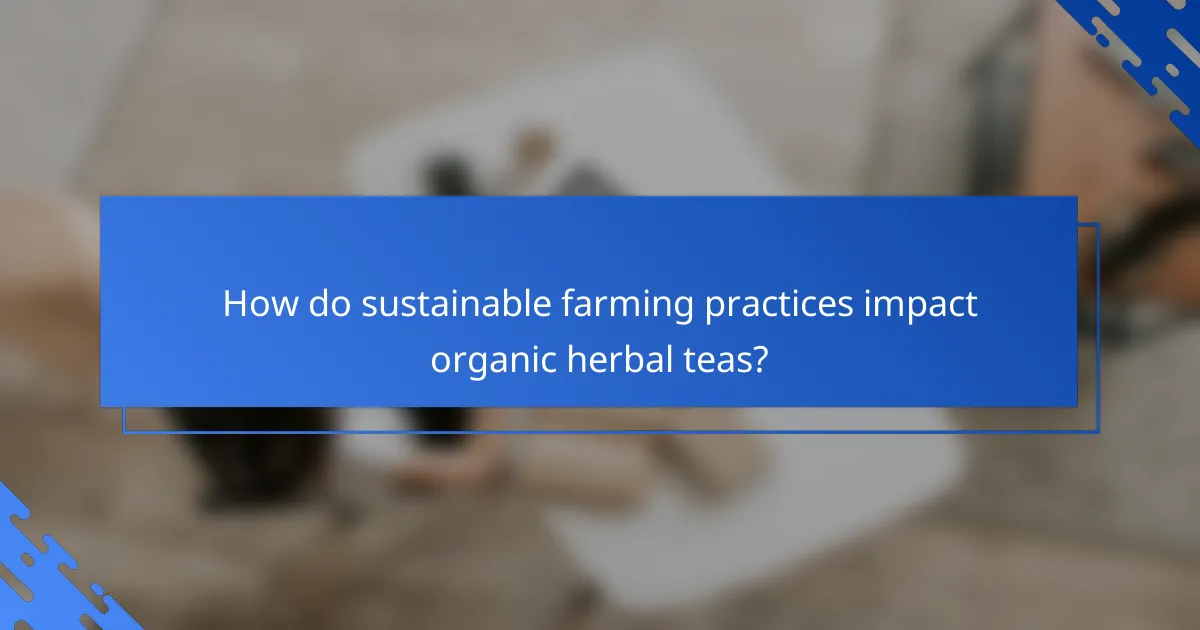
How do sustainable farming practices impact organic herbal teas?
Sustainable farming practices significantly enhance the quality and environmental impact of organic herbal teas. By focusing on methods that protect the ecosystem, these practices improve soil health, flavor, and support local economies.
Improved soil health
Sustainable farming enhances soil health through techniques like crop rotation, cover cropping, and organic composting. These methods enrich the soil with nutrients, promote microbial diversity, and reduce erosion, leading to more robust plant growth.
Healthy soil contributes to the production of high-quality herbal teas, as it allows plants to absorb essential minerals and water more effectively. This results in stronger, more resilient plants that yield better flavors and aromas.
Enhanced flavor profiles
The use of sustainable farming practices often leads to more complex and rich flavor profiles in organic herbal teas. By avoiding synthetic fertilizers and pesticides, farmers allow the natural characteristics of the herbs to shine through.
Herbs grown in nutrient-rich, well-maintained soil tend to develop deeper flavors and aromas. For instance, teas made from herbs like chamomile or mint can exhibit a wider range of taste notes when cultivated sustainably.
Support for local economies
Sustainable farming practices often prioritize local production, which supports nearby economies. By sourcing organic herbal teas from local farmers, consumers can help create jobs and stimulate economic growth in their communities.
Additionally, local farmers are more likely to reinvest in their communities, further enhancing the economic benefits. Purchasing organic herbal teas from local sources also reduces transportation emissions, contributing to a more sustainable environment overall.

What eco-friendly packaging options are available for herbal teas?
Eco-friendly packaging options for herbal teas include biodegradable tea bags, recyclable packaging materials, and compostable labels. These choices help reduce environmental impact while maintaining product integrity and freshness.
Biodegradable tea bags
Biodegradable tea bags are made from natural materials that break down over time, minimizing waste. Common materials include plant-based fibers like cornstarch or hemp, which decompose within a few months in the right conditions.
When selecting biodegradable tea bags, look for certifications that ensure they meet composting standards, such as ASTM D6400 or EN 13432. This guarantees that the bags will decompose effectively in commercial composting facilities.
Recyclable packaging materials
Recyclable packaging materials, such as cardboard boxes and certain types of plastic, can be processed and reused, reducing landfill waste. Ensure that the packaging is clearly labeled with recycling symbols to guide consumers in proper disposal.
Consider using materials that are widely accepted in local recycling programs. For instance, many areas accept paperboard and specific plastics, but check local regulations to confirm what can be recycled in your region.
Compostable labels
Compostable labels are made from materials that can break down in composting environments, contributing to soil health. These labels often use plant-based inks and adhesives that do not hinder the composting process.
When choosing compostable labels, verify that they comply with recognized standards like ASTM D6868. This ensures that the labels will decompose alongside the packaging, providing a fully eco-friendly solution for herbal tea products.

How does biodiversity contribute to herbal tea quality?
Biodiversity plays a crucial role in enhancing the quality of herbal teas by promoting healthier plants and richer flavors. A diverse ecosystem supports various plant species, which can lead to improved resilience and unique taste profiles in the final product.
Increased resilience to pests
A diverse range of plants can naturally deter pests and diseases, reducing the need for chemical interventions. For instance, planting companion herbs can create a balanced ecosystem that attracts beneficial insects, which help control pest populations.
Farmers practicing organic methods often find that a mix of species leads to healthier crops. This resilience not only protects the plants but also contributes to a more sustainable farming practice, ultimately benefiting the quality of the herbal tea produced.
Diverse flavor characteristics
Biodiversity directly influences the flavor profiles of herbal teas. Different plant varieties can impart unique tastes and aromas, creating a more complex and enjoyable drinking experience. For example, blending various mint species can yield a tea with layered minty notes.
Herbal tea producers can experiment with different combinations of plants to develop signature blends that stand out in the market. This variety not only appeals to consumers but also allows for creative expression in tea crafting.
Support for pollinators
Healthy biodiversity supports pollinator populations, which are essential for the reproduction of many herbal plants. By cultivating a variety of flowering plants, farmers can attract bees and other pollinators, enhancing the yield and quality of their crops.
Implementing practices such as planting wildflower strips or maintaining hedgerows can significantly benefit pollinator health. This, in turn, leads to more robust herbal plants and higher-quality teas, aligning with sustainable farming practices.

What are the benefits of organic certification for herbal teas?
Organic certification for herbal teas offers several advantages, including enhanced consumer trust, the potential for higher prices, and access to specialized markets. These benefits stem from adherence to sustainable farming practices and eco-friendly standards that appeal to environmentally conscious consumers.
Consumer trust and transparency
Organic certification fosters consumer trust by ensuring that herbal teas are produced without synthetic pesticides or fertilizers. This transparency allows consumers to make informed choices, knowing that their purchases support sustainable farming practices. Brands that display organic certification often attract loyal customers who prioritize health and environmental responsibility.
Moreover, organic labels provide clear information about farming practices, which can enhance brand reputation. Companies that are transparent about their sourcing and production methods can differentiate themselves in a crowded market.
Higher market prices
Herbal teas that are organically certified generally command higher market prices compared to non-organic counterparts. This price premium can range from 20% to 50%, depending on the specific product and market demand. Consumers are often willing to pay more for organic products, perceiving them as healthier and more environmentally friendly.
Producers can benefit from this price differential, which can help cover the costs associated with organic farming practices, such as certification fees and sustainable cultivation methods. However, it is essential for producers to balance quality and pricing to maintain competitiveness.
Access to niche markets
Organic certification opens doors to niche markets that prioritize sustainability and health, such as specialty tea shops and health food stores. These markets often seek unique, high-quality products, making organic herbal teas an attractive option. Additionally, organic certification can facilitate entry into international markets where organic products are in high demand.
Producers should consider targeting specific consumer segments, such as those interested in wellness or eco-friendly products, to maximize their market reach. Engaging in marketing strategies that highlight the organic certification can further enhance visibility in these niche markets.

How can consumers identify sustainable herbal tea brands?
Consumers can identify sustainable herbal tea brands by looking for specific certifications, researching brand practices, and checking ingredient sourcing. These steps help ensure that the tea is produced in an environmentally friendly manner and supports biodiversity.
Look for certifications
Certifications are a reliable way to identify sustainable herbal tea brands. Look for labels such as USDA Organic, Fair Trade, or Rainforest Alliance, which indicate adherence to specific environmental and social standards. These certifications often require rigorous audits and compliance with sustainable farming practices.
Additionally, some brands may carry local certifications that reflect regional sustainability efforts. Familiarizing yourself with these local certifications can enhance your ability to choose eco-friendly options.
Research brand practices
Investigating a brand’s practices is essential for understanding its commitment to sustainability. Check the brand’s website or product packaging for information on their farming methods, water usage, and labor practices. Brands that prioritize sustainability often share their environmental impact reports or sustainability goals.
Engaging with customer reviews and third-party articles can provide insights into a brand’s reputation regarding sustainability. Look for mentions of eco-friendly initiatives, such as reducing plastic use or supporting local farmers.
Check ingredient sourcing
Ingredient sourcing is a critical factor in determining the sustainability of herbal teas. Brands that source their ingredients from local or organic farms typically have a lower environmental impact. Look for teas that highlight their sourcing practices, such as using wild-harvested herbs or supporting biodiversity through diverse crop cultivation.
Be cautious of brands that do not disclose their sourcing information, as this may indicate a lack of transparency. When in doubt, opt for brands that provide clear details about where and how their ingredients are grown and harvested.

What are the environmental impacts of conventional tea farming?
Conventional tea farming can lead to significant environmental issues, including pesticide runoff and soil degradation. These practices not only harm local ecosystems but also affect the quality of the soil and water resources.
Pesticide runoff
Pesticide runoff occurs when chemicals used in conventional tea farming wash into nearby water bodies during rainfall or irrigation. This runoff can contaminate rivers and lakes, harming aquatic life and disrupting local ecosystems.
Moreover, pesticide residues can enter the food chain, affecting not only wildlife but also human health. Consumers should be aware of the potential risks associated with non-organic teas and consider opting for certified organic options to avoid these harmful substances.
Soil degradation
Soil degradation in conventional tea farming is primarily caused by the heavy use of chemical fertilizers and pesticides, which can deplete essential nutrients and disrupt soil microbiomes. Over time, this leads to reduced soil fertility and increased erosion, making it difficult to sustain healthy tea crops.
To combat soil degradation, sustainable farming practices such as crop rotation, cover cropping, and organic amendments can be implemented. These methods help maintain soil health and promote biodiversity, ensuring a more resilient agricultural system.

